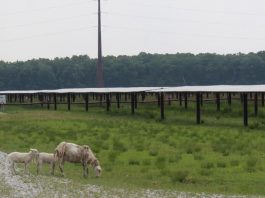By John Krull
TheStatehouseFile.comÂ
INDIANAPOLIS – Like spring flowers, teacher strikes seem to be blooming all over.
West Virginia.
Kentucky.
Arizona.
Oklahoma.
There even are mutterings from teachers here in Indiana.
Trying to determine why so many teachers have left the classroom in protest has become a growth industry.
Some argue that it’s because state courts have refused to enforce state constitutions, all of which have provisions requiring quality educations for the state’s children. Others contend that the issue is generational – because there now are greater costs associated with caring for the elderly in an aging population, we’re taking funds from the young to pay for the old. Still others assert that the problem is class-driven – we’re starving schools and school children so we can offer tax cuts to the wealthy.
There’s truth to all these analyses, but the real point of contention is much simpler than that.
It comes down to what Aretha Franklin sang about.
R-E-S-P-E-C-T.
I talk with a lot of teachers. I know they’re frustrated, even angry these days.
Their frustration doesn’t spring from a desire to make more money.
Yes, if they could be paid more for doing a hard job, most teachers would love that. But most teachers didn’t go into education because they thought the classroom was the path to riches.
No, most teachers became teachers because they care about children, about children’s educations, about children’s welfare, about children’s lives.
That’s why teachers are willing to spend 50, 60 or 70 hours a week working with children, even when some of those children are poorly behaved or just difficult to deal with.
All that time with children ought to earn teachers some credibility in our discussions about how we ought to educate our young people.
Too often, though, that hasn’t been the case.
Too often, when we gather to talk about how students might perform better, or schools might function more effectively, there just isn’t enough space at the table for teachers.
There is room, of course, for politicians who preach accountability, but who never seem to take responsibility when a problem arises – say, a teacher shortage or a failure to hit promised test-score targets.
There also is room for self-proclaimed education “reformers,†many of whom are focused less on making school a productive and satisfying experience for students than on some other agenda – such as, rerouting tax dollars to religious institutions or finding ways to break teachers’ unions.
And there is room, of course, for the education reform experts – also often self-proclaimed – whose expertise doesn’t seem to extend much beyond directing public funds to for-profit education corporations or not-for-profits with administrative staffs so lavishly funded that a concubine would blush at the largesse.
But not, all too often, teachers.
There is the stuff of tragedy here.
The concerns – a need for better student performance in an increasingly competitive world and a desire to grant parents larger voices in their children’s schooling – that gave birth to the education reform movement were valid ones.
The way to meet those concerns was old-fashioned. It would have involved bringing everyone involved – students, parents, administrators, elected officials, business leaders and, yes, teachers – together to share concerns, work through differences and find common ground.
Instead, in too many places – including Indiana – far too many political leaders and the self-proclaimed education reform crowd made the arrogant and ignorant assumption that teachers couldn’t possibly be concerned about children and their schooling.
Instead of making the education reform movement a collaborative effort designed to solve shared problems, they transformed it into a struggle. Instead of making teachers their partners, they made them their adversaries.
Instead of seeking solutions, they went looking for fights.
And they got them.
Now, everyone – students, parents, teachers, communities and states – suffers.
So much of this could have been avoided.
Should have been avoided.
If the people who thought they knew it all just had listened to Aretha, this spring would be a happier for students and in schools in a lot of places.
FOOTNOTE: John Krull is director of Franklin College’s Pulliam School of Journalism, host of “No Limits†WFYI 90.1 Indianapolis and publisher of TheStatehouseFile.com, a news website powered by Franklin College journalism students.
This article posted by the City-County Observer without opinion, bias or editing.





